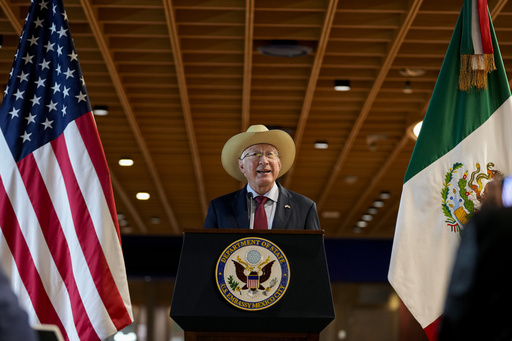
MEXICO CITY — U.S. Ambassador Ken Salazar expressed strong dissatisfaction on Wednesday regarding Mexico’s reluctance to accept assistance in combating drug cartels, stating that the country has “closed the doors” to security collaboration.
During a press briefing, Salazar voiced his most severe criticisms thus far of the escalating violence, persistent police corruption, and the Mexican administration’s misplaced belief that “there is no problem.” He emphasized, “When they insist ‘there is no problem, we have statistics to prove it,’ that does not reflect the truth. There is a significant issue at hand.”
The Mexican foreign relations ministry did not respond immediately to inquiries concerning Salazar’s remarks.
Drawing attention to the recent surge of violence in Sinaloa, Salazar referenced statements made by local officials regarding the discovery of multiple bodies in the region. Sinaloa state police chief Gerardo Mérida reported the occurrence, stating authorities stumbled across a collection of bodies on a roadside, but they were still in the process of counting to ascertain the total number.
“We have identified five bodies among what we found, but some remain unaccounted for as they are dismembered, leading some to estimate there could be seven,” explained Mérida.
Ruben Rocha, governor of Sinaloa, exemplified the prevailing sentiment among Mexican officials when he stated on Tuesday, amid reports of similar ghastly incidents, that “we’re managing well, and we will recover soon.” Salazar countered this claim, noting that “the dead can be seen everywhere” in Sinaloa.
In the past, Salazar had defended numerous actions taken by the Mexican government. However, he has now denounced former President Andrés Manuel López Obrador’s “hugs not bullets” strategy, asserting that it has proven ineffective in addressing cartel-related violence. López Obrador’s term concluded on September 30, but his successor, President Claudia Sheinbaum, has vowed to maintain the same approach, even as military forces under her command appear more prepared to engage in combat.
Conflict erupted between rival factions of the Sinaloa drug cartel following the arrest of two drug lords, Ismael “El Mayo” Zambada and Joaquín Guzmán López, in the United States on July 25 after they traveled there in a small aircraft. Zambada later alleged that he had been forcibly taken onto the plane by Guzmán López, triggering a violent clash between the factions led by Zambada and the “Chapitos,” the sons of imprisoned drug lord Joaquin “El Chapo” Guzmán.
The Mexican government later pointed to the U.S. detentions as the catalyst for the uptick in violence, leading Salazar to note that Mexico subsequently curtailed anti-drug collaboration.
“That situation rapidly escalated, and the Mexican government shut down its doors for cooperation,” Salazar stated. The ambassador also chastised efforts by both López Obrador and Sheinbaum to minimize the scope of crime and violence, contending that they portray an exaggerated perspective of the situation, insisting that crime rates are decreasing.
While Salazar did not elaborate on why he found the Mexican government’s statistics dubious, there have been indications that the government has begun altering its methodology for reporting homicide data in recent days.
He remarked on the troubling reality facing the Mexican populace, stating, “Whether it’s business people, journalists like yourselves who operate in the streets, or ranchers, such as the cattleman murdered in Sinaloa over the weekend for being a local leader, they do not experience safety.” Salazar added that the ongoing violence is a grave concern for Mexico, expressing that simply denying the problem and shifting blame onto the U.S. is far from the solution.
He also pointed fingers at López Obrador for turning down “$22 million” in aid, referencing the former president’s decision to withdraw from the Merida Initiative, a U.S.-backed program designed to provide funding for the training and equipment of Mexican police forces.
Salazar explained, “It was rejected due to ideological reasons, along with other justifications.” López Obrador had stated that he did not want American military assets, but much of the funding was devoted to training and systemic reform.
From the start of his presidency on December 1, 2018, López Obrador made significant cuts to police budgets while empowering the military, the navy, and the militarized National Guard to take the lead in law enforcement.
Salazar emphasized, “You cannot expect police officers to perform their duties effectively when they are compensated poorly.” Notably, Salazar had previously supported López Obrador despite numerous concerns regarding his approach to militarizing policing, consolidating power, dismantling regulatory bodies, and suppressing U.S. interests.
It remains uncertain whether Salazar’s critical stance on Wednesday was influenced by Donald Trump’s recent electoral victory, as Trump has been a vocal critic of Mexico for an extended period.
